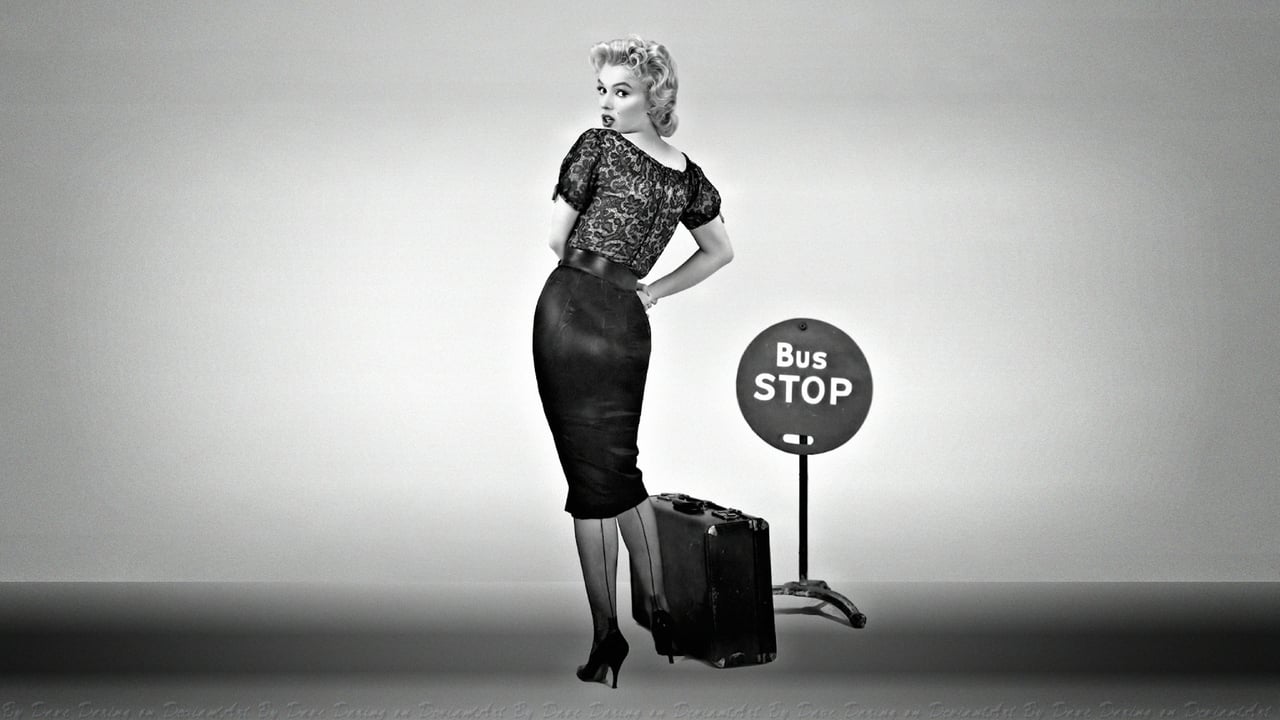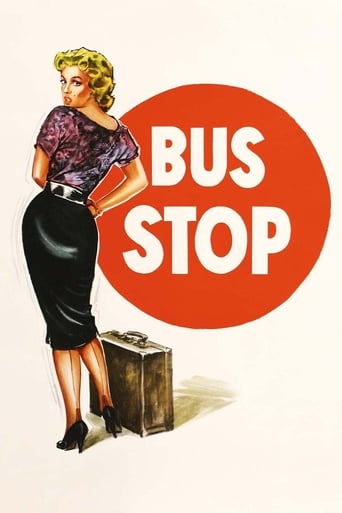Maidgethma
Wonderfully offbeat film!
Juana
what a terribly boring film. I'm sorry but this is absolutely not deserving of best picture and will be forgotten quickly. Entertaining and engaging cinema? No. Nothing performances with flat faces and mistaking silence for subtlety.
Winifred
The movie is made so realistic it has a lot of that WoW feeling at the right moments and never tooo over the top. the suspense is done so well and the emotion is felt. Very well put together with the music and all.
JohnHowardReid
Copyright 1956 by 20th Century-Fox Film Corp. New York opening at the Roxy: 31 August 1956. U.S. release: 14 August 1956. U.K. release: 19 November 1956. Australian release: 27 September 1956. Sydney opening at the Regent. 8,496 feet. 94 minutes.SYNOPSIS: A young and innocent cowboy, Bo Decker (Don Murray), is brought from his Montana ranch by his friend Virgil (Arthur O'Connell) to a rodeo in Phoenix, Arizona. At the Blue Dragon café in Phoenix, Bo discovers Cherie (Marilyn Monroe), a singer of uncertain virtue. He is indignant at the inattention of patrons during her number and bullies them into a respectful silence. NOTES: Location scenes filmed in Phoenix, Arizona. The play opened on Broadway at the Music Box on 2 March 1955 and ran a most satisfactory 478 performances. Kim Stanley and Albert Salmi were the leads. Other players: Elaine Stritch, Anthony Ross, Phyllis Love, Lou Polan, Crahan Denton, Patrick McVey. The play was directed by Harold Clurman, produced by Robert Whitehead and Roger L. Stevens.Film debuts of Don Murray and Hope Lange. (Don't take any notice of reports that Murray had a role in 1951's "Dallas". Some computers don't know the difference between Don Murray and Zon Murray). Nominated for Hollywood's most prestigious award for Supporting Actor, Don Murray lost out to Anthony Quinn in "Lust for Life". Number 16 at the US/Canadian box-office for 1956. Number 10 on the National Board of Review's list of the Best American Films of 1956. One of Bosley Crowther's selections for his New York Times list of the Ten Best Pictures of 1956.COMMENT: William Inge's Broadway hit was originally a one-set affair about half-a-dozen bus passengers stranded at a roadside café during a blizzard. This has been brilliantly expanded by George Axelrod so that one is not aware of the film's stage origins until about 30 minutes from the end when the film too becomes confined to the original stage setting. Indeed, some of the scenes which Axelrod has added are the most memorable in the film — Murray waking up the drowsing bus passengers by doing push-ups at five o'clock in the morning or embarrassing Marilyn Monroe by hollering out to her at the rodeo.All Marilyn Monroe's scenes are superbly conceived. She doesn't come on for about 20 minutes. Finally we catch sight of her sitting forlornly on the window-sill in the back-room of a broken-down bar. A few minutes later she is hustling drinks out of Arthur O'Connell and then she launches into that memorable rendition of "Ole Black Magic", tattily staged with colored lights, photographs of which have been immortalized in countless books and articles on Marilyn Monroe.Some may argue that Marilyn Monroe's performance is a little too calculated and lacks the spontaneity and naturalness Don Murray brings to his role. Be this as it may, Marilyn Monroe's study of Cherie is an engaging and sympathetic one and the fact that at times there seems to be something a little too contrived about her characterization is as much a fault of the script as anything else. It is a tribute to Marilyn Monroe's skill as an actress that she manages to make the character as believable as she does, given such potentially awkward script moments as her confidences in Vera and above all, her sudden change of heart towards Bo. Marilyn Monroe makes an honest and for the most part very successful endeavor to give a rounded portrayal, whereas Don Murray simply skims — albeit very charmingly — over the surface of his role, playing Bo throughout on a purely superficial level as a simple- minded rustic. The other players are competent. We particularly liked Robert Bray's personable bus driver. Hope Lange, though, is wasted in a very tiny, colorless role, while Hans Conreid and Casey Adams have such minuscule parts they are little more than bit players.As might be expected from a Broadway director used to blocking action on a stage of similar shape, Logan fills up the wide CinemaScope screen very ably; but otherwise his direction is best described as unobtrusive. There's very little camera movement, for instance. (Logan had worked in Hollywood in the latter 1930s as both a full director and dialogue director). Other technical credits are thoroughly professional. As usual, the work of the Fox sound department is absolutely brilliant.
weezeralfalfa
I don't understand why some reviewers criticize Don Murray's(Bo) performance as idiotic. That's what the director wanted! This is basically a screwball romantic comedy. If a young Cary Grant or contemporary Jerry Lewis had been there instead of Murray, I think this would have been more easily recognized for what it is. Today, no doubt, Bo would be drugged to calmness, as a clear cut case of ADHD. True, in the age of compulsory group schooling, Bo's unfamiliarity with girls suggests another kind of sexual orientation, or a residence so far from a school that it wasn't practical for him to go to a school. Think of Bo as Li'l Abner and Cherie as Daisy Mae, except that Li'l Abner is the one doing the chasing. If this isn't your brand of humor, I guess you can complain, but don't fault Murray!Marilyn(Cherie, not Cherry, as Bo prefers), as Bo's quarry, is a deglamorized, beat up, cheaply costumed, Ozark hillbilly floozy, who happens to be singing as part of her entertainment act in a Phoenix dive. Her extreme hillbilly twang and terrible rendition of "That Old Black Magic" speaks against her ambition to become a Hollywood star. She doesn't like her present job, being pawed and ogled at and abused by her manager. Thus, the sudden offering to become the wife of a Montana ranch owner offers an alternative from disappointment in Hollywood and her present situation. I'm sure it wasn't every desirable man who was willing to take this ignorant floozy for a wife. Bo seemed not to care about her past. He seemed unusually honest about his feelings. If he was as honest in his portrayal of his situation in Montana, he might make a good husband, if on the hyperexcitable side. But Cherie was taking a chance that he might be a con man. As a husband, he may be excessively controlling, possessive and jealous, thus potentially abusive. But, maybe not so bad. Remember, he's only visiting Phoenix, so has minimal time to land Cherie. Thus, he has to be rather forward to impress her quickly. At least, his spectacular rodeo performance proved he was very good in handling horses and cattle. His extreme persistence in his devotion to her, accompanied by embarrassing public displays, at first turned off Cherie. But, in the end, her resistance melting away. I hope she didn't regret it. Although not real obvious, I figured Virgil didn't go back to Montana with them because he had a crush on Grace and because he figured Cherie was now Bo's new partner. No clue what Virgil might do for a living around Grace's Diner.Reportedly, Marilyn was hell to work with during shooting: supersensitive, complaining, crying, forgetting her lines. Murray was not impressed with her basic egocentric personality.A favorite antic of Bo's: when he lassos Cherie, who's about to get on the bus for LA(I assume), to make her get on the bus for Montana."The Bus Stop Song" was composed for this film. It was sung during the credits and also early on the bus, led by guitar- playing Arthur O'Connell(Bo's friend(Virgil).Available as part of the Marilyn Premier DVD Collection.
gavin6942
A naive but stubborn cowboy (Don Murray) falls in love with a saloon singer (Marilyn Monroe) and tries to take her away against her will to get married and live on his ranch in Montana.So, Don Murray was nominated for best supporting actor (he lost to Anthony Quinn for "Lust for Life"). I have to admit I do not really know who Murray was, and today (2015) it seems the only big name attached is Monroe. But then, I have not (yet) seen "Lust for Life", so I cannot fairly say if Murray was robbed.The strangest thing about this film is the title. Sure, once you see it you can understand why you might call it "Bus Stop", but it seems to be much more about ranches and cheap saloons than public transit.
bobbysoxer97
I will start by saying that I am not a fan of Marilyn Monroe and never have been. So, when I decided to sit down to watch this, I was a bit skeptic. However, I was delightfully surprised! This was Monroe's first film after her year long break to attend acting school and one can definitely see the improvement. Although not an Oscar winning performance, the depth of her character surprised me. On a whole, the film itself is quite interesting. The first twenty minutes were a bit rocky for me, but it steadily improved. The last two scenes of the picture were worth waiting for. So beautifully done, with so much tenderness. Again, the film is not a "ten out of ten" but is worth a try...even if you aren't normally a fan of Monroe.P.S. The theme, which is sung by "The Four Lads," is extremely catchy.

